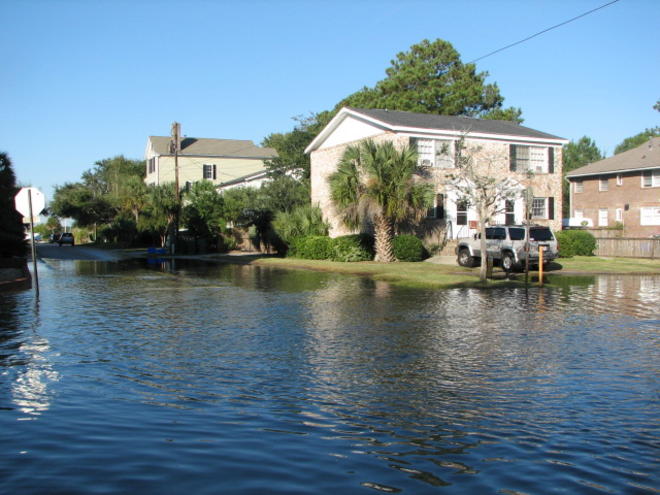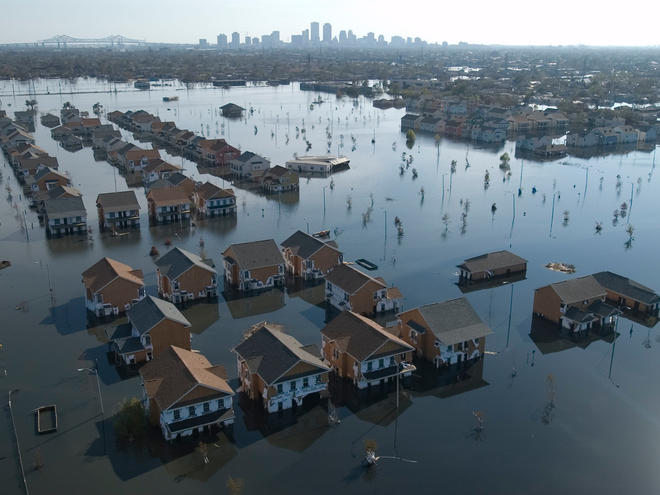

The US government announced 2018 as the fourth-warmest year on record. Overall, the past five years have been the five warmest years since record-keeping began in the late 1800s.
2018 was a costly year too, for the United States. According to NOAA, in 2018, 14 weather and climate disasters each exceeded $1 billion in the United States.
Unfortunately, in the US and globally, the amount of heat-trapping gasses entering the atmosphere continues to rise. As the planet rapidly heats up, we see extreme impacts of this warming across all landscapes, affecting wildlife and people around the globe.
What’s happening right now:
- Sea level rise: Global average sea level has risen by about 7–8 inches since 1900. Rising seas endanger coastal cities and small island nations by exacerbating coastal flooding, storm surge and contributing to more dangerous weather events.
- Coral degradation: Changes in water temperature cause algae to leave coral reefs, turning the reefs white and making them vulnerable to disease and death – a phenomenon known as coral bleaching. Mass coral bleaching events have become five times more common worldwide over the past 40 years. 2015-2017 was the longest and most widespread global coral bleaching event on record.
- Arctic warming: The Arctic is warming faster than anywhere else on Earth and ice-free summers could become a reality as early as 2040. Over the past 30 years, the oldest and thickest ice in the Arctic has declined by a stunning 95 percent. This loss of sea ice endangers both humans and wildlife.
- More extreme heat waves and cold spells: Because of the rapidly warming climate, weather extremes are becoming more common. Heat waves are occurring more often than they used to in major cities across the United States. The average heat wave season across 50 major cities is 45 days longer than it was in the 1960s. In addition, changes in the jet stream, caused by a warming atmosphere, are linked to recent polar vortex events in the United States. A weakening of the polar vortex allows cold arctic air to descend farther south than in the past.
- Flooding: Floods are the most common natural hazard in the United States. Global floods and extreme rainfall have surged by more than 50% this decade and are now occurring at a rate four times higher than in 1980.
Because we are already locked in to certain levels of warming, climate change will continue to harm millions of people and nature worldwide. That means it is critical that communities prepare for climate impacts.
Demand action - Reach out to your local elected officials and ask if your city has a disaster response plan in place. Keeping communities safe starts by having a strong plan.
You can also play a big part in reducing emissions that cause climate change with a few simple changes to your daily routine to lower your carbon footprint:
Electricity - Ask your utility company to switch you to renewable energy, many utilities can make the change with little to no effect on your bills. If you own your house, check out solar panels or explore community solar projects in your area.
Transportation - Transportation is the largest source of emissions in the United States. Think about walking or riding a bike when you can, using hybrid or electric vehicles, carpooling, or taking public transit. Just taking these actions one or more times per week helps.
Food - Agriculture causes about a quarter of human-produced greenhouse gas emissions. While we still need food to eat, we can prevent food waste by producing buying, or taking only what we need. By eating healthily and responsibly, we can lighten the burden that our appetites put on wildlife, wild places, and the climate.
Remember: Don't Give Up - Talk about climate change with your friends and family, your city council, or school. Start holding your leaders accountable. Find out if your stores, your restaurants, and your city are committed to climate action by visiting wearestillin.com. And if they are not on the list, ask them to join.
Pledge to cut your carbon footprint.
Published February 06, 2019 at 06:00AM
No comments:
Post a Comment